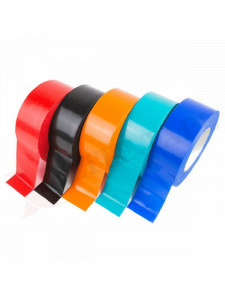The Versatile World of Insulation Tape
Insulation tape, often referred to as electrical tape, is an essential component in many industries, from electrical work to crafting. This simple yet highly effective adhesive tape has transformed the way we handle wiring, repairs, and various DIY projects. In this article, we will explore the characteristics, uses, and benefits of insulation tape, as well as some tips for its effective application.
What is Insulation Tape?
Insulation tape is a type of pressure-sensitive tape made from various materials such as vinyl, cloth, or rubber, coated with an adhesive on one side. The primary purpose of insulation tape is to insulate electrical wires and prevent any potential electrical leakage, which could lead to short circuits or electrical fires. It comes in a variety of colors, sizes, and thicknesses, each serving specific purposes.
Characteristics of Insulation Tape
One of the defining features of insulation tape is its excellent dielectric properties. This means it can effectively resist electric current, making it an ideal choice for insulating electrical connections. Additionally, insulation tape is designed to be flexible and durable, allowing it to conform to various surfaces and withstand different environmental conditions. Many types of insulation tape also have resistance to heat, moisture, and abrasion, further enhancing their reliability.
Another important characteristic of insulation tape is its ease of use. The pressure-sensitive adhesive allows the tape to bond easily to wires and surfaces without the need for additional tools or adhesives. This makes it an invaluable resource for DIY enthusiasts, electricians, and maintenance workers alike.
Common Uses of Insulation Tape
Insulation tape has a plethora of applications across various fields
1. Electrical Work The primary use of insulation tape is to wrap and insulate electrical wires. It protects against electrical shock and short circuits and is essential for any electrical repair or installation task.
2. Home Repairs Beyond electrical work, insulation tape can serve as a temporary fix for various household items, such as sealing leaks in pipes, securing loose components, or even patching up small tears in furniture.
3. Crafting Insulation tape's vibrant colors and versatility make it a popular choice for crafting. Artists and crafters use it to create intricate designs or embellish items, thanks to its adhesive nature and variety of colors.
insulation tape

4. Automotive Industry In vehicles, insulation tape can be used to protect and bind electrical wiring, securing loose parts, and ensuring that connections remain stable and safe over time.
5. Sports and Fitness Athletes and trainers utilize insulation tape to wrap and support joints or muscles, providing stability and preventing injury during physical activities.
Benefits of Using Insulation Tape
The advantages of insulation tape extend beyond its basic functionality. For one, it enhances safety by preventing electrical mishaps caused by exposed wires. It is also cost-effective and readily available, making it an accessible solution for both professionals and amateurs. Furthermore, the lightweight and compact nature of insulation tape means it can be easily transported and stored, making it perfect for on-the-go repairs or projects.
Tips for Effective Application
To maximize the benefits of insulation tape, here are some practical tips
1. Clean the Surface Ensure that the surface of the wire or object you are wrapping is clean and dry before applying the tape. This will help the adhesive bond better and provide a more secure insulation.
2. Stretch the Tape When applying the tape, stretch it slightly as you wrap. This will ensure that the tape adheres firmly and provide a snug fit around the wire or object.
3. Overlap Wraps For maximum insulation, make sure to overlap the layers of tape by about half as you wrap. This helps create a thicker layer of protection.
4. Avoid Excessive Heat While many types of insulation tape are heat resistant, exposing the tape to excessive heat will reduce its lifespan and efficacy. Therefore, keep it away from sources of high temperatures.
In conclusion, insulation tape is a versatile tool with numerous applications that extend beyond its primary purpose of electrical insulation. Its convenience, reliability, and effectiveness make it a staple in many industries and households. Whether you’re an electrician, a DIY enthusiast, or a creative artist, understanding the properties and uses of insulation tape can help you utilize this essential tool to its fullest potential.
-
XIANGFAN Rubber Tape-Ultimate Solutions for All Your Insulation NeedsNewsJun.24,2025
-
XIANGFAN Rubber Tape-Protection for Industrial and Residential ApplicationsNewsJun.24,2025
-
XIANGFAN Rubber Tape: Superior Safety and Sealing for Demanding EnvironmentsNewsJun.24,2025
-
XIANGFAN Rubber Tape: Reliable Solutions for Every Electrical ChallengeNewsJun.24,2025
-
XIANGFAN Electrical & Industrial Tape: Powering Reliability Across IndustriesNewsJun.24,2025
-
XIANGFAN Electrical & Industrial Tape: Excellence in Every ApplicationNewsJun.24,2025
